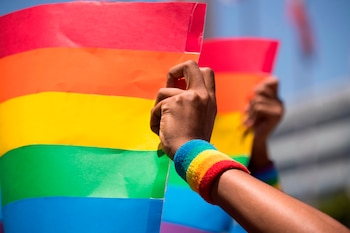
There is considerable concern among the LGBTIQ+ community in the Colombian Atlantic Coast region because in 2021 there was a steep increase in homicides with diverse sexual orientation in that territory in the north of the country.
According to data from the NGO Caribe Affirmativo, 38 murders or femicides of that group were perpetrated in that area, which represents a 78 percent increase compared to these same crimes committed in 2020.
“Compared to previous years, there has been a constant increase in cases of violence since 2017,” is extracted from the report of the Human Rights Observatory of this NGO on the situation of rights of lesbian, gay, bisexual and trans people in the Colombian Caribbean.
This NGO blames this increase in violence against the LGBTIQ+ collective on “the setbacks and the breaking of commitments by the current government to the Peace Agreement” and the “entry and reaccommodation of illegal armed actors with their 'corrective' action against what is categorized as' deviant '”, among others.
In addition, according to the report, hate speech by the ruling class that “makes prejudice and violence invisible, recriminating and justifying prejudice and violence” has also increased, as murders increased by 300 percent compared to the 12 recorded in 2017, when the implementation of the peace agreement with the FARC began.
This region, which encompasses nine departments (including the San Andrés archipelago), is experiencing “a remembrance of the cruelest era in Colombian history: threats, murders, massacres and displacements,” according to Caribe Affirmativo.
The department of Magdalena, whose capital is the city of Santa Marta, was the one that reported the most, with a notable increase compared to previous years, while Atlántico and its capital, Barranquilla, experienced a decline in homicides and femicides last year compared to previous ones.
On the other hand, the majority of victims were trans people with 9 homicides, followed by gay men of whom there were 8 cases and most of the murders were committed with bladed weapons, “which may represent premeditation, forcefulness, brutality and torture.”
These are cases like that of Christina Cantillo, a trans leader from Santa Marta who worked for women's rights and sex workers and had reported abuses by authorities. She had her security scheme revoked, despite having warned that her life was in danger, and was murdered last December 8 at the door of her house.
The report also includes 28 threats (8 individual and 20 collective), mainly through pamphlets; 2 attempted homicide and 5 injuries, as well as 4 cases of domestic violence and at least 192 reports of sexual violence against LGBTIQ+ people.
“Since the beginning of the peace process, one of the violent actions that has increased the most against social leaders is threats; and among them, to people because of their sexual orientation or gender identity,” denounced Caribe Affirmativo. Since the middle of last year, the Ombudsman's Office had been denouncing an increase in “prejudice” against the LGBTIQ+ community, with 98 murders in the first five months of 2021, especially in the Colombian Caribbean.
In 2020, according to partial figures from the NGO Colombia Diversa, 75 LGBTIQ+ people were killed throughout the country and in 2019 a total of 106.
(With information from EFE)
KEEP READING:
Últimas Noticias
Debanhi Escobar: they secured the motel where she was found lifeless in a cistern
Members of the Specialized Prosecutor's Office in Nuevo León secured the Nueva Castilla Motel as part of the investigations into the case

The oldest person in the world died at the age of 119
Kane Tanaka lived in Japan. She was born six months earlier than George Orwell, the same year that the Wright brothers first flew, and Marie Curie became the first woman to win a Nobel Prize

Macabre find in CDMX: they left a body bagged and tied in a taxi
The body was left in the back seats of the car. It was covered with black bags and tied with industrial tape
The eagles of America will face Manchester City in a duel of legends. Here are the details
The top Mexican football champion will play a match with Pep Guardiola's squad in the Lone Star Cup

Why is it good to bring dogs out to know the world when they are puppies
A so-called protection against the spread of diseases threatens the integral development of dogs




